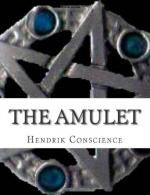Both then arose, and approaching Geronimo and Mary, sat down in silence. Their countenances betrayed vexation and mutual displeasure.
The young man, with tearful eyes, looked inquiringly at his uncle. Mary bowed her head, but her heaving bosom gave evidence of the struggle of her heart.
For some time there was a painful silence in the gondola. Mr. Van de Werve contemplated his daughter, who seemed overwhelmed by sorrow. Signor Deodati was deeply moved by Geronimo’s earnest gaze.
The Italian noble was the first to break silence. “Come, sir,” he said, “let us make these young people happy.”
“With all my heart, signor; but what will you do? My daughter is descended from an illustrious house; she must live in the world in a manner to do honor to her birth; as her father, I have duties to fulfil which I cannot disregard.”
“Poor Geronimo!” said the Signor Deodati, in a tone of compassion, and with a deep sigh. “You would accuse me of cruelty, would you not? and this lovely young girl would hate the old man for his insensibility. It was not for that I crossed the seas in my old age.”
He reflected a few minutes, then extending his hand to Mr. Van de Werve, he said: “My lord, I wish to show my good-will. I accept entirely your conditions, and in recompense for my sacrifices I ask only your friendship. Shall our children then be happy?”
Mr. Van de Werve grasped cordially the hand which was extended to him, and said to his daughter: “Mary, embrace this good gentleman; he will be your second father.”
Mary cast herself into the arms of the old man; a cry of joy escaped the lips of Geronimo; even the sailors, although they comprehended but little of what they saw, were touched.
Whilst they were yet exchanging felicitations, the gondola swept around the point of land which had concealed the city from view, and Antwerp, with its thousand vessels, its lofty spires and noble edifices, lay spread out in all its majestic beauty before the eyes of Signor Deodati.
A cry of admiration burst from his lips.
“O che bella citta! What a beautiful city!” he exclaimed.
“What is that magnificent tower, which like sculptured lace lifts its beautiful spire proudly to heaven, and like a giant looks down upon all others? What are those singular buildings whose rounded cupolas and pointed roofs so far exceed in height the surrounding houses? Oh! let the gondola float with the current; your city enchants me, and I wish to enjoy the view for a few moments.”
Mr. Van de Werve gratified the curiosity of the Italian gentleman by pointing out to him the most remarkable buildings of the city, saying: “Before you now is the new city constructed at his own expense by Gillibert de Schoonbeke—a man to whom Antwerp owes its later increase and the creation of countless streets and houses.[9] Those large and massive towers, in which you may notice loopholes, and which




